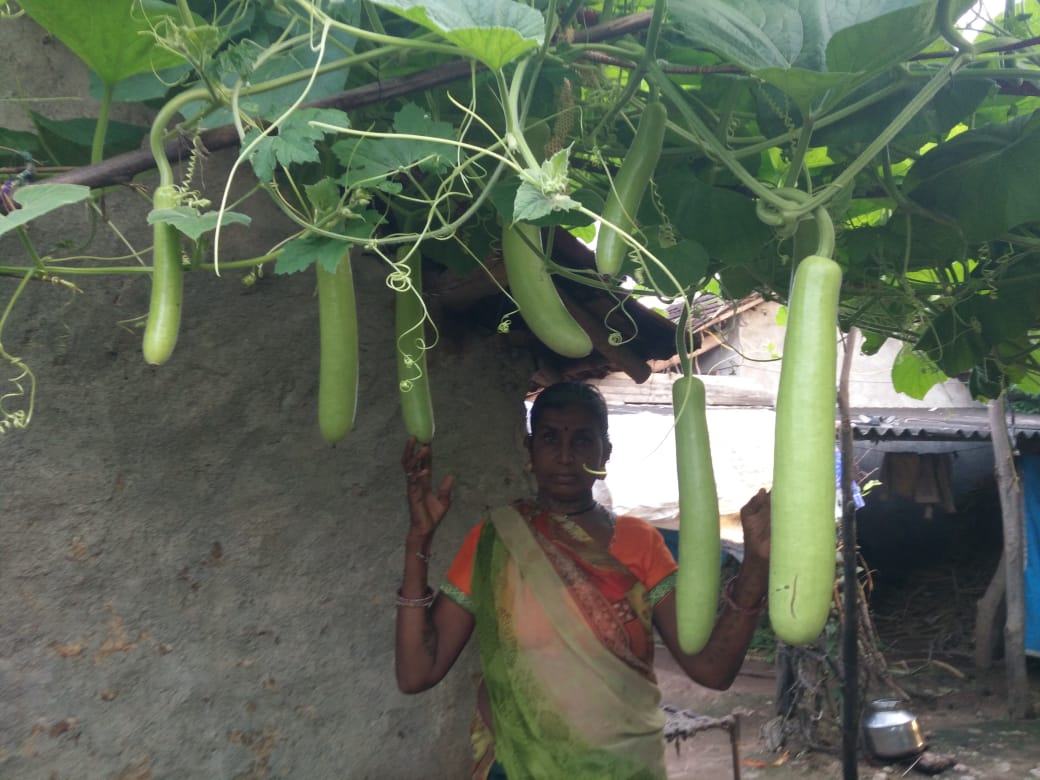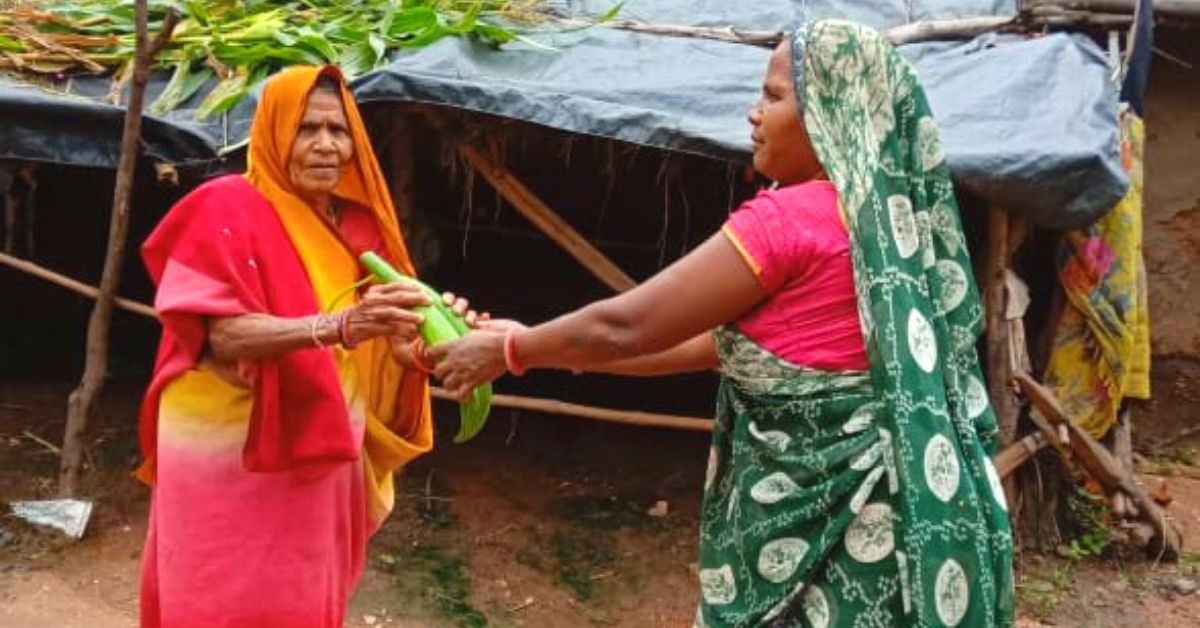Life came to a standstill for Rehmatben Sheikh, a resident of Konjdi, a village in Gujarat’s Bhavnagar district when she learnt that two of her sons had lost their jobs during the nationwide lockdown in March. Soon after, the single mother of three also lost her livelihood as a wage earner when agricultural labour work stopped. This was a huge blow, as this was during the Rabi harvest period, which would otherwise bring in a decent amount of money.
Although her sons got some earnings through NREGA, the household income was not enough to meet the expenses. Thankfully, respite came in the form of an initiative called ‘Gardens of Hope ~ Emergency Kitchen Gardens’
Started by Gujarat based NGO, Utthan, the programme is helping rural communities in four Gujarat districts (Bhavnagar, Dahod, Mahisagar and Panchmahal) to grow their own chemical-free food at home so that their nutritional needs are met despite the financial crunch during the lockdown and the consequent livelihood crisis.
What makes this initiative stand out is that each family growing vegetables will have to share the produce with three other families who do not have land, water resources or currently not growing vegetables.
Rehmatben joined the training sessions on gardening conducted by the NGO in May-June. Since she did not have enough space in her backyard, she decided to begin farming on her rooftop.

“We received a gardening kit with seeds (150 grams per person) and organic fertiliser for free — and using that I set up my garden. I am growing cluster beans, bitter gourd and okra, and share the produce with three other families. This solution is helping all of us save money and get healthy food,” Rehmatben tells The Better India. Now that she has acquired the expertise, she is planning to increase her production post lockdown and earn a stable income from it.
Rehmatben’s family is one of the thousands of families who are reaping benefits under this sustainable programme.
“We have been working with the rural communities of Gujarat for four decades now to address basic issues around water, food, livelihood by mobilising the vulnerable into community-led local institutions. Post lockdown, we learnt that government relief alone is not enough to support economically backward families. Vegetable supply in many villages has been cut due to the movement restrictions. To meet family needs, it was feasible to implement the concept of kitchen gardens in about 1,500 sq ft of area,” Pallavi Sobti Rajpal, Deputy CEO of Utthan, tells The Better India.
The NGO distributed kits to over 2,514 families across 53 villages and due to the sharing policy, more than 7,500 families are now getting fresh and chemical-free vegetables like okra, cluster beans, black-eyed pea, bottle gourd, bitter gourd and sponge gourd/ridged gourd. The organisation has estimated that each person will get nutrition security of 700 grams/day from the kitchen gardens. It aims to help another 5000 families set up similar gardens.
Why Kitchen Gardens?
Apart from migrant workers who lost their jobs, there were several other issues that erupted in the lockdown.
For example, due to movement and transportation restrictions, it became increasingly difficult for families to procure vegetables. Due to a supply reduction, prices of the vegetables soared and many families were unable to afford them.
The marginal farmers in the community were also affected as they were unable to sell their rabi crop (wheat, maize) outside their villages. Additionally, they faced challenges in procuring Kharif crop seeds from their vendors.
When the NGO was actively distributing ration kits in early April, they realised many families are being left out from government subsidies and Public Distribution System due to lack of proper documents.
“Some of the early problems that we identified included a disruption in the supply chain of food and vegetables, inadequate quantum of food basket relief announced, prioritisation of other things over food and nutrition and left out families still facing crises. A lot of these still continue to pose a challenge. We came up with a self-sustainable model to ensure nutrition security through vegetables that would be beneficial in the long run,” says Pallavi.
How The Model Works
Utthan has collaborated with gram panchayats and local community institutions in every village to identify and mobilise the affected communities. The team members have got agricultural experts on board to understand the process which should go into ensuring the transfer of knowledge and skills.
After preparing a list of vulnerable families that needed urgent help, the team prepared an internal guideline which contained types of seeds, water and area requirements, harvesting cycles and so on. Alongside, the NGO also trained local Self-Help Groups to make bio-fertilisers or jeevamrut through an existing cadre of sustainable agriculture practitioners
“Most of our initial workshops for the team and key community leaders were conducted online since we are working remotely due to the lockdown. Experts from the team were involved to answer doubts and share effective tips to prevent crop damage and develop a healthy yield. Meanwhile, for on-ground workshops, we followed hygiene protocols during seed distribution and conducted demonstrations. These workshops proved to be very crucial for capacity building and also introducing chemical-free farming,” Jaya Rathod, Programme Coordinator with the NGO tells The Better India.
Even after the workshop, each local NGO member stays in touch with the families to provide assistance and solve their queries at each stage of cultivation.
The onus of growing food is either on one family or is equally divided between the concerned families. The NGO clarifies the work distribution during the workshops. The produce is equally distributed with the neighbours.
“The process of harvesting vegetables is not easy and one has to cater to their needs at all times. But all the hard work is worth it all. Last month we saved Rs 3,000 by growing our own food and up to 15 people are now consuming chemical-free vegetables,” says Nadiben from the Umariya village.
This helpful trait is being observed across all 53 villages. A staggering example of this was seen in Valespur village where the NGO identified 20 potential kitchen garden recipients.
While filling the google form of the recipient profiles, the potential respondents were asked if they would be willing to share their produce with others.
“‘Ben (sister), even if you don’t tell us, we will share the vegetables with others’ a local woman said. The 20 women who took up gardening ended up supporting another 80 families. I believe if we encourage more families to grow the food they eat; the village can manage its own vegetable needs for at least 5-6 months in the year,” says Rubina Bhatti, Saathi Fellow at Utthan.
Mamtaben from Valespur is more than happy to share her produce with others, “I am doing everything on my own including making biofertilizers but not for once did I feel odd about not getting help from my neighbours. The pandemic is a tough time and most of us are reeling under the financial crisis. Being kind and generous comes naturally in our close-knit community now more than ever.”
Even though the NGO has a check and balance system like field visits, asking beneficiaries to share photos and videos, the model is entirely running on trust.
“Though it is within the role of community volunteers to monitor the activities and check if families are getting their share, we have seen such heartwarming stories where people are going the extra mile to help each other. This collective effort is an assurance that people will survive the pandemic,” adds Babu Prajapati, Area Manager of Utthan’s tribal area Programme.
This community-led effort by Utthan and villagers is showing that we do not need revolutions or rocket science solutions to reduce the effects of lockdown. Listening to what locals need, analysing the local problems and coming up with personalised solutions such as these is in itself a game-changer.
Edited by Gayatri Mishra
If you found our stories insightful, informative, or even just enjoyable, we invite you to consider making a voluntary payment to support the work we do at The Better India. Your contribution helps us continue producing quality content that educates, inspires, and drives positive change.
Choose one of the payment options below for your contribution-
By paying for the stories you value, you directly contribute to sustaining our efforts focused on making a difference in the world. Together, let's ensure that impactful stories continue to be told and shared, enriching lives and communities alike.
Thank you for your support. Here are some frequently asked questions you might find helpful to know why you are contributing?

